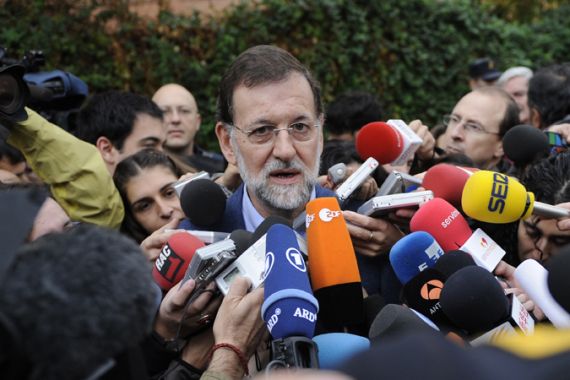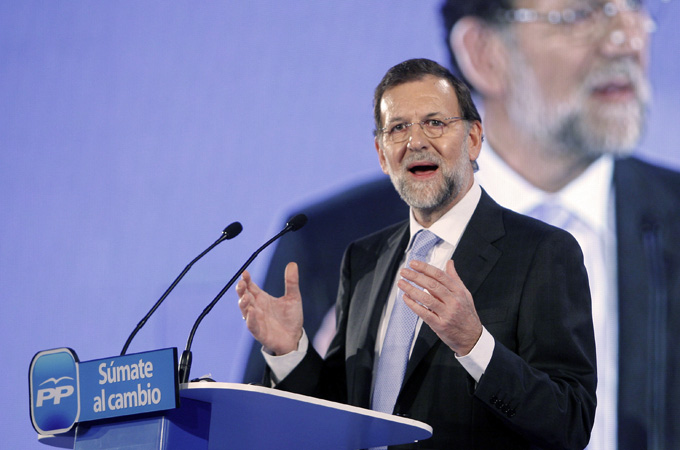Profile: Mariano Rajoy
Known for directness rather than charisma, Spain’s presumptive next prime minister faces daunting economic challenges.

 |
| Rajoy is expected to introduce severe austerity cuts in an effort to protect Europe’s fifth largest economy [EPA] |
Mariano Rajoy, leader of Spain’s centre-right Popular Party and likely the country’s next prime minister, is the man many Spaniards hope will fix their ailing economy.
If exit polls from Sunday’s general elections hold, Rajoy’s opposition conservatives are on their way to ousting the ruling Socialists in a vote dominated by a staggering unemployment rate and Spain’s central role in Europe’s debt crisis.
The Popular Party won an absolute majority in parliament, according to the TNS-Demoscopia survey by Spain’s state-run television, obtaining between 181 and 185 seats, compared to 154 in the last legislature. A majority in the 350-seat lower chamber is 176.
When Rajoy is officially named the winner, it will come after two election losses, in 2004 and 2008, and present him with the daunting challenge of resurrecting an economy that posted no growth in the third quarter of this year.
He must also help Spain meet commitments to the EU on deficit-reduction with tax rises or spending cuts without jeopardizing prospects for desperately needed economic expansion.
With such obstacles ahead, many observers unfamiliar with Spanish politics are wondering: just who is Mariano Roy?
Political rise
Even some followers of Rajoy admit the 56-year-old may fail to excite. Even so, Spanish voters have placed their faith in his apparently straightforward style over proven leadership.
“His great weakness of being a boring and predictable man has been converted into his great strength,” said Anton Losada, a political analyst at the University of Santiago de Compostela
Educated in a Jesuit school and trained as a lawyer, Rajoy turned to politics at a young age. He first joined the Popular Alliance Party, founded by sympathisers of General Francisco Franco, Spain’s former dictator, and was elected as regional official at the age of 26. He soon rose to serve in several national ministerial posts.
Rajoy has admitted a fondness for cigars, cycling and the Real Madrid football team.
Serving as deputy prime minister to Jose Maria Aznar, Spain’s conservative prime minister from 1996 to 2004, Rajoy won prestige for his handling of a 2002 oil leak and Spain’s role in the 2003 invasion of Iraq.
Aznar named Rajoy to succeed him as party leader, and had it not been for a terrorist attack on Madrid’s commuter trains three days before the 2004 parliamentary election, he may have become prime minister then.
Rajoy ran and lost again in 2008 and was criticised even by the right-wing press. But he survived an attempt within his party to replace him, quietly getting rid of the old Aznar conservatives and moving the People’s Party towards the centre.
‘Distance runner’
As the economic crisis was crippling Spain, Rajoy worked with the Socialists in drawing up constitutional measures to control the budget deficit. He vowed in his election manifesto to tackle unemployment and stabilise Spain’s public finances.
Financial markets are looking to Rajoy to take swift action to prevent Spain being sucked deeper into the eurozone debt
crisis.
Rajoy, who has little international experience and limited English, is expected to name a heavyweight economy minister to deepen painful austerity measures at home and travel abroad to persuade investors that Spain has its accounts in order.
According to Jose Maria Lassalle, a People’s Party MP, Rajoy’s economic policy will make him look like “a long-distance runner, not a sprinter, and the economic crisis needs long-distance runners”.
Even so, Rajoy will have little time to show results with Span bracing for deeper spending cuts.